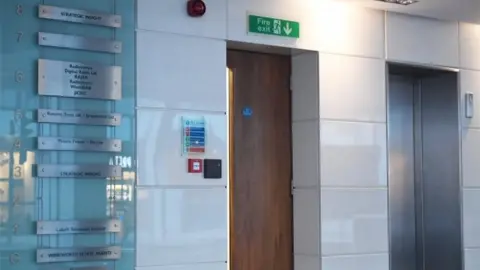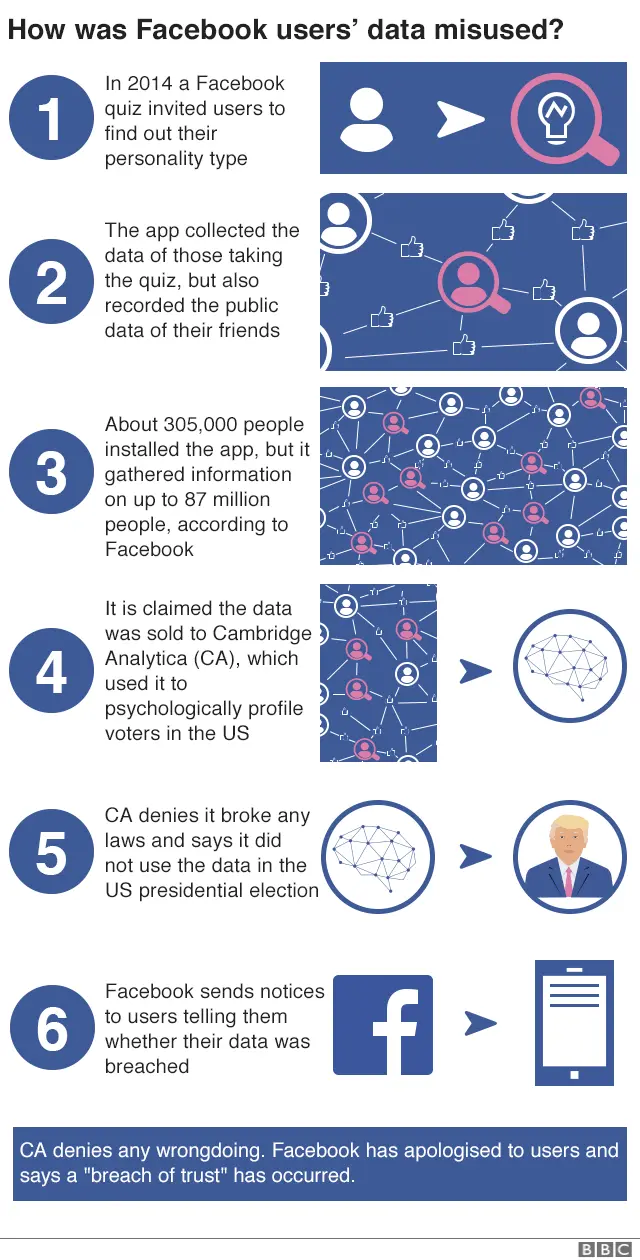Cambridge Analytica: Closure 'will not stop investigation'
 Reuters
ReutersThe closure of Cambridge Analytica will not stop a probe into the firm's handling of millions of people's data, investigators have said.
The firm has been accused of acquiring data from up to 87 million Facebook profiles for use in political campaigns.
Cambridge Analytica closed on Wednesday citing a loss of business.
The Information Commissioner's Office (ICO) said its investigation will still "pursue individuals and directors".
And Damian Collins, chair of the Commons select committee for Digital, Culture, Media and Sport (DCMS) tweeted: "Cambridge Analytica and [parent company] SCL Group cannot be allowed to delete their data history by closing.
"The investigations into their work are vital."
He told the BBC: "We've got to make sure this isn't an attempt to run and hide, that these companies are not closing down to try to avoid them being rigorously investigated over the allegations that are being made against them."
Mary Creagh, Labour MP for Wakefield, tweeted: "Outrageous. Insolvency used to cover up illegality".

How the scandal unfolded
17 March: The Observer and the New York Times publish accounts by Cambridge Analytica's ex-employee Christopher Wylie, saying 50 million Facebook accounts were improperly harvested by the company
19 March: Channel 4 airs undercover footage of Cambridge Analytica's CEO, Alexander Nix, giving examples of how the firm could swing elections around the world with tactics such as smear campaigns and honey traps. The company denies any wrongdoing
20 March: Alexander Nix is suspended
23 March: The UK's data watchdog is granted a warrant to search Cambridge Analytica's office
27 March: Christopher Wylie appears in front of a committee of UK MPs
4 April: Facebook says it now believes up to 87 million people's data was improperly shared with Cambridge Analytica
10 April: Facebook CEO Mark Zuckerberg is questioned by US lawmakers about the scandal
17 April: Alexander Nix, the former boss of Cambridge Analytica, refuses to appear before British MPs
26 April: The UK parliamentary committee threatens to issue Mark Zuckerberg with a "formal summons for him to appear when he is next in the UK" as questions remain unanswered
2 May: Cambridge Analytica announces its closure

In a statement, Cambridge Analytica said it had been "vilified" for legal activities that are a "standard component" of advertising in the political world.
The statement added that its parent company SCL Elections was also commencing bankruptcy proceedings.
An ICO spokeswoman said its investigators will "examine closely" the details of the closure and will "closely monitor any successor companies".
She said: "The ICO has been investigating the SCL Group and Cambridge Analytica as part of a wider investigation into the use of personal data and analytics by political campaigns, social media companies and others.
"The ICO will continue its civil and criminal investigations and will seek to pursue individuals and directors as appropriate and necessary even where companies may no longer be operating."
According to Facebook, data about up to 87 million of its members was harvested by a quiz app and then passed on to the Cambridge Analytica.
The company is accused of mapping the behaviour of voters in the run-up to the 2016 US election and EU referendum.
'Collaboration'
On Wednesday, a cyber-security specialist told MPs that a company he claimed was closely linked to Cambridge Analytica had worked with various pro-Brexit groups during the referendum campaign.
Chris Vickery told the Digital, Culture, Media and Sport Committee that "beyond a shadow of a doubt" the Canadian firm - AggregateIQ (AIQ) - had been involved in "some form of collaboration or co-ordination" with the groups.
AIQ- a Canadian data analytics firm - has also been suspended from using the Facebook platform.
The company denies ever being part of Cambridge Analytica, its parent company SCL or accessing improperly obtained Facebook data.
Representatives from Vote Leave and Leave.EU have repeatedly denied any wrongdoing.

